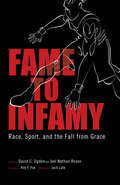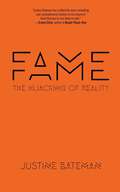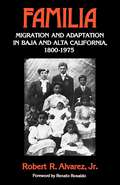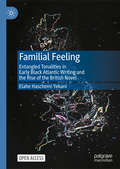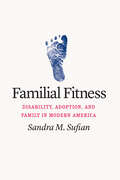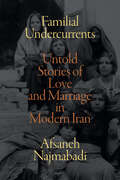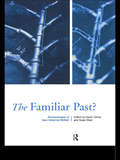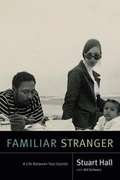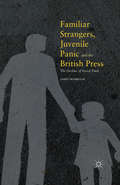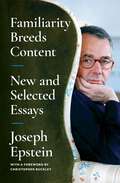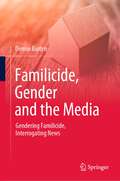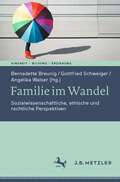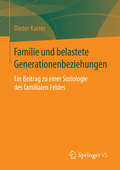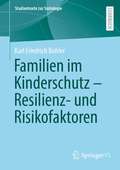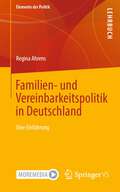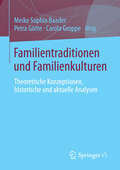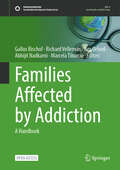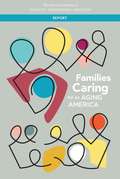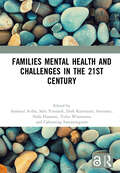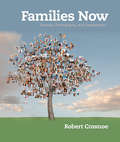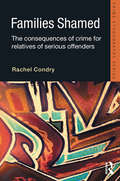- Table View
- List View
Fame to Infamy: Race, Sport, and the Fall from Grace (Margaret Walker Alexander Series in African American Studies)
by Jack LuleFame to Infamy: Race, Sport, and the Fall from Grace follows the paths of sports figures who were embraced by the general populace but who, through a variety of circumstances, real or imagined, found themselves falling out of favor. The contributors focus on the roles played by athletes, the media, and fans in describing how once-esteemed popular figures find themselves scorned by the same public that at one time viewed them as heroic, laudable, or otherwise respectable. The book examines a wide range of sports and eras, and includes essays on Barry Bonds, Kirby Puckett, Mike Tyson, Mark McGwire and Sammy Sosa, Branch Rickey, Joe Louis and Max Schmeling, Michael Jordan, Wilt Chamberlain, and Jim Brown, as well as an afterword by noted scholar Jack Lule and an introduction by the editors. Fame to Infamy is an interdisciplinary volume encompassing numerous approaches in tracing the evolution of each subject's reputation and shifting public image.
Fame: The Hijacking of Reality
by Justine BatemanA passionate and critical analysis of the life cycle of Fame, from film producer/director and former worldwide TV star Justine Bateman. “Wholly riveting.” —New York Times Book Review “Justine Bateman was famous before selfies replaced autographs, and bags of fan mail gave way to Twitter shitstorms. And here’s the good news: she took notes along the way. Justine steps through the looking glass of her own celebrity, shatters it, and pieces together, beyond the shards and splinters, a reflection of her true self. The transformation is breathtaking. Revelatory and raucous, fascinating and frightening, Fame is a hell of a ride.” —Michael J. Fox, actor, author of A Funny Thing Happened on the Way to the Future Entertainment shows, magazines, websites, and other channels continuously report the latest sightings, heartbreaks, and triumphs of the famous to a seemingly insatiable public. Millions of people go to enormous lengths to achieve Fame. Fame is woven into our lives in ways that may have been unimaginable in years past. And yet, is Fame even real? Contrary to tangible realities, Fame is one of those “realities” that we, as a society, have made. Why is that, and what is it about Fame that drives us to spend so much time, money, and focus to create the framework that maintains its health? Mining decades of experience, writer, director, producer, and actress Justine Bateman writes a visceral, intimate look at the experience of Fame. Combining the internal reality-shift of the famous, theories on the public’s behaviors at each stage of a famous person’s career, and the experiences of other famous performers, Bateman takes the reader inside and outside the emotions of Fame. The book includes twenty-four color photographs to highlight her analysis.
Familia: Migration and Adaptation in Baja and Alta California, 1880-1975
by Robert R. Alvarez Jr.Anthropologists, historians, and sociologists will find here a striking challenge to accepted explanations of the northward movement of migrants from Mexico into the United States. Alvarez investigates the life histories of pioneer migrants and their offspring, finding a human dimension to migration which centers on the family. Spanish, American, and English exploits paved the way for exchange between Baja and Alta California. Alvarez shows how cultural stability actually increased as migrants settled in new locations, bringing their common values and memories with them.
Familial Feeling: Entangled Tonalities in Early Black Atlantic Writing and the Rise of the British Novel
by Elahe Haschemi YekaniThis open access book discusses British literature as part of a network of global entangled modernities and shared aesthetic concerns, departing from the retrospective model of a postcolonial “writing back” to the centre. Accordingly, the narrative strategies in the texts of early Black Atlantic authors, like Equiano, Sancho, Wedderburn, and Seacole, and British canonical novelists, such as Defoe, Sterne, Austen, and Dickens, are framed as entangled tonalities. Via their engagement with discourses on slavery, abolition, and imperialism, these texts shaped an understanding of national belonging as a form of familial feeling. This study thus complicates the “rise of the novel” framework and British middle-class identity formation from a transnational perspective combining approaches in narrative studies with postcolonial and queer theory.
Familial Fitness: Disability, Adoption, and Family in Modern America
by Sandra M. SufianThe first social history of disability and difference in American adoption, from the Progressive Era to the end of the twentieth century. Disability and child welfare, together and apart, are major concerns in American society. Today, about 125,000 children in foster care are eligible and waiting for adoption, and while many children wait more than two years to be adopted, children with disabilities wait even longer. In Familial Fitness, Sandra M. Sufian uncovers how disability operates as a fundamental category in the making of the American family, tracing major shifts in policy, practice, and attitudes about the adoptability of disabled children over the course of the twentieth century. Chronicling the long, complex history of disability, Familial Fitness explores how notions and practices of adoption have—and haven’t—accommodated disability, and how the language of risk enters into that complicated relationship. We see how the field of adoption moved from widely excluding children with disabilities in the early twentieth century to partially including them at its close. As Sufian traces this historical process, she examines the forces that shaped, and continue to shape, access to the social institution of family and invites readers to rethink the meaning of family itself.
Familial Undercurrents: Untold Stories of Love and Marriage in Modern Iran
by Afsaneh NajmabadiNot long after her father died, Afsaneh Najmabadi discovered that her father had a secret second family and that she had a sister she never knew about. In Familial Undercurrents, Najmabadi uncovers her family’s complex experiences of polygamous marriage to tell a larger story of the transformations of notions of love, marriage, and family life in mid-twentieth-century Iran. She traces how the idea of “marrying for love” and the desire for companionate, monogamous marriage acquired dominance in Tehran’s emerging urban middle class. Considering the role played in that process by late nineteenth- and early twentieth-century romance novels, reformist newspapers, plays, and other literature, Najmabadi outlines the rituals and objects---such as wedding outfits, letter writing, and family portraits---that came to characterize the ideal companionate marriage. She reveals how in the course of one generation men’s polygamy had evolved from an acceptable open practice to a taboo best kept secret. At the same time, she chronicles the urban transformations of Tehran and how its architecture and neighborhood social networks both influenced and became emblematic of the myriad forms of modern Iranian family life.
Familiar Past?: Archaeologies of Later Historical Britain
by Sarah Tarlow Susie WestThe Familiar Past surveys material culture from 1500 to the present day. Fourteen case studies, grouped under related topics, include discussion of issues such as: * the origins of modernity in urban contexts * the historical anthropology of food * the social and spatial construction of country houses * the social history of a workhouse site * changes in memorial forms and inscriptions * the archaeological treatment of gardens.The Familiar Past has been structured as a teaching text and will be useful to students of history and archaeology.
Familiar Stranger: A Life Between Two Islands
by Stuart Hall Bill Schwarz"Sometimes I feel myself to have been the last colonial." This, in his own words, is the extraordinary story of the life and career of Stuart Hall—how his experiences shaped his intellectual, political, and theoretical work and how he became one of his age's brightest intellectual lights. Growing up in a middle-class family in 1930s Kingston, Jamaica, still then a British colony, the young Stuart Hall found himself uncomfortable in his own home. He lived among Kingston's stiflingly respectable brown middle class, who, in their habits and ambitions, measured themselves against the white elite. As colonial rule was challenged, things began to change in Kingston and across the world. In 1951 a Rhodes scholarship took Hall across the Atlantic to Oxford University, where he met young Jamaicans from all walks of life, as well as writers and thinkers from across the Caribbean, including V. S. Naipaul and George Lamming. While at Oxford he met Raymond Williams, Charles Taylor, and other leading intellectuals, with whom he helped found the intellectual and political movement known as the New Left. With the emotional aftershock of colonialism still pulsing through him, Hall faced a new struggle: that of building a home, a life, and an identity in a postwar England so rife with racism that it could barely recognize his humanity. With great insight, compassion, and wit, Hall tells the story of his early life, taking readers on a journey through the sights, smells, and streets of 1930s Kingston while reflecting on the thorny politics of 1950s and 1960s Britain. Full of passion and wisdom, Familiar Stranger is the intellectual memoir of one of our greatest minds.
Familiar Strangers, Juvenile Panic and the British Press: The Decline of Social Trust
by James MorrisonThis book argues that Britain is gripped by an endemic and ongoing panic about the position of children in society – which frames them as, alternately, victims and threats. It argues the press is a key player in promoting this discourse, which is rooted in a wide-scale breakdown in social trust.
Familiarity Breeds Content: New and Selected Essays
by Joseph EpsteinA collection of personal essays from America&’s most revered essay writer, Joseph Epstein.America&’s greatest living essayist writes about life and aging and being all too nicely out of it. In these personal pieces, he takes on topics as varied as grieving for a dead son, learning Latin late in life, and the pleasures of living with cats. Epstein gives us a &“bonfire of his own vanities,&” his thoughts about why watching sports is so impossibly seductive, what it is like to be short, and why he misses smoking even decades as a health-obsessed non-smoker. Above all, he writes about the literary life and the endless joys that reading and writing have brought to a self-confessed &“lucky man.&”
Familicide, Gender and the Media: Gendering Familicide, Interrogating News
by Denise BuitenThis book examines the complex issue of familicide-suicide – the murder of a partner and children followed by suicide. The purpose of the book is two-fold: to advance a feminist sociological analysis of familicide as a form of gender-based violence, and to examine how it is reported on in news. The first section contextualises interpretations of familicide against the dual ascendancy of – and contestation around - feminist and mental illness discourses in public policy and debate. Advancing a feminist sociological analysis of familicide-suicide, it shows the value of ‘continuum thinking’ for understanding complex and varied forms of gender-based violence. Section Two examines Australian news reporting on familicide-suicide, showing the ways cultural assumptions about domestic and family violence and mental illness shape news reporting. It analyses how discourses of gender, disability, age, and the ‘family’ serve to rationalise certain news frames and reflects on the thorny ethical issues inherent in reporting on familicide. Arguing for a nuanced approach to gender-based violence and how it is reported, this book will be of interest for scholars of gender and violence, as well as media and journalism.
Familie im Wandel: Sozialwissenschaftliche, ethische und rechtliche Perspektiven (Kindheit – Bildung – Erziehung. Philosophische Perspektiven)
by Gottfried Schweiger Bernadette Breunig Angelika WalserDie Familie unterliegt einem steten Wandel, und zwar sowohl im Hinblick auf ihre Form als auch auf ihre Bedeutung und nicht zuletzt ihre Regulierung durch legale, kulturelle, religiöse oder moralische Normen. Welche Formen der Beziehung als konstitutiv für die Familie angesehen werden, steht ebenso zur Diskussion wie die Frage der Anerkennung und des Schutzes der Familie und verschiedener Familienformen durch den Staat. Insbesondere Techniken der Reproduktion und Veränderungen des sozialen Gefüges in Loslösung der ‚klassischen‘ Kernfamilie haben eine Vielzahl an neuen Familienformen wie Patchworkfamilien, Co-Parenting-Familien oder Familien mit gleichgeschlechtlichen Elternpaaren ermöglicht und normalisiert. Ziel dieses Bandes ist es, verschiedene disziplinären Perspektiven aus den Sozial- und Rechtswissenschaften, der Theologie und Philosophie zusammenzubringen, die auf die Familie und ihren Wandel mit Blick auf ausgewählte Fragestellungen und Familienformen reflektieren – wobei Co-Parenting und assistierte Reproduktion besonders im Fokus liegen.
Familie und belastete Generationenbeziehungen
by Dieter KarrerFamiliäre Beziehungen sind doppelgesichtig: Es sind Liebes- und Machtbeziehungen, Beziehungen ohne Berechnung und doch wird aufgerechnet, persönliche Beziehungen, die einer starken Moralisierung unterliegen. Wie äußert sich der ,,Eigensinn des Familialen", wenn die Generationenbeziehungen in einer Krise unter Druck geraten: Wenn erwachsene Söhne und Töchter (wieder) bei den Eltern leben und von ihnen unterstützt werden müssen, weil sie erwerbslos sind und nicht in der Lage, auf eigenen Beinen zu stehen. Oder wenn Eltern pflegebedürftig werden und die Kinder, die ihr eigenes Leben haben, mit der Aufgabe konfrontiert sind, sich um sie zu kümmern. Wie erleben die betroffenen Eltern und Kinder die Situation, wie gehen sie damit um und welche Probleme und Konflikte sind damit verbunden. Diese Fragen stehen im Mittelpunkt des Buches, das sich auch als ein Beitrag zur Erforschung familialer Beziehungen versteht, ein Thema, das in den letzten Jahren etwas aus dem Blickfeld der Soziologie geraten ist.
Familien im Kinderschutz – Resilienz- und Risikofaktoren (Studientexte zur Soziologie)
by Karl Friedrich BohlerDieses Lehrbuch thematisiert die Perspektive von Eltern und Herkunftsfamilien in erzieherischen Hilfen und Kinderschutzverfahren. Es stellt jene Bereiche der Sozialen Arbeit vor, die für die Beteiligung und Unterstützung der Eltern bzw. Herkunftsfamilie in Verfahren zur Abwendung einer Gefährdung des Kindeswohls und in anschließenden Hilfeprozessen von zentraler Bedeutung sind. Wobei wir zum besseren Verständnis immer wieder auf Fallbeispiele aus der Praxis der Kinder- und Jugendhilfe zurückgreifen werden.
Familien- und Vereinbarkeitspolitik in Deutschland: Eine Einführung (Elemente der Politik)
by Regina AhrensDieses Lehrbuch gibt einen fundierten Einblick in das Politikfeld Familienpolitik. Es zeichnet die historischen Entwicklungen in Deutschland nach und zeigt politikfeldanalytische Erklärungen auf. Das Lehrbuch ermöglicht damit auch ein Verständnis der aktuellen familienpolitischen Diskurse. Es richtet sich vornehmlich an Studierende im Bachelor und Master, aber auch an Praktikerinnen und Praktiker, die sich aufgrund von neuen beruflichen Aufgaben in die Grundzüge der Familienpolitik in Deutschland einlesen möchten. Das Buch enthält ergänzendes Online-Material.
Familientraditionen und Familienkulturen
by Meike Sophia Baader Petra Götte Carola GroppeWas macht Familie als kulturbildende und tradierende Instanz aus? Welche Bedeutung hat Familie für die innerfamiliale Erziehung und Sozialisation? In einem zeitlichen Rahmen von der Frühen Neuzeit bis zur Gegenwart fragen die Autorinnen und Autoren dieses Bandes nach sozialen und institutionellen Bedingungen von Familienkulturen und -traditionen, nach ihrer familialen und gesellschaftlichen Bedeutung, nach innerfamiliären Akteuren und symbolischen Ordnungen. Darüber hinaus werden unterschiedliche Begriffs-, Theorie- und Methodenangebote aus den Sozial- und Kulturwissenschaften aufgegriffen und hinsichtlich ihres Erkenntniswerts für Familienkulturen und -traditionen diskutiert und weiterentwickelt. Die vielschichtige Herangehensweise erschließt ein neues Forschungsfeld für die erziehungswissenschaftliche Familienforschung.
Families Affected by Addiction: A Handbook (Sustainable Development Goals Series)
by Jim Orford Richard Velleman Marcela Tiburcio Gallus Bischof Abhijit NadkarniThis Open Access book sheds new light on the wide range of Affected Family Members' experiences. At a conservative estimate, there are at least 100 million adults across the globe who are affected by their relatives’ addiction problems. These Affected Family Members (AFMs) experience multiple stresses, coping dilemmas, and a lack of information and support, and are at heightened risk for ill-health. The results are very costly, both from the personal and from the public services point of view. The volume elaborates on the barriers to providing effective help, including political neglect, under-representation in both policy and service delivery models, the lack of involvement and encouragement from health and social care professionals, the stigmatisation and bias as barriers to care, and the range of evidence-based interventions. It also explores the similarities and differences of all of these areas depending on the type of addiction problem that the family is affected by – alcohol, illicit drugs, gambling, etc. While covering the more commonly reported work in high-income countries, the contributions put strong emphasis on the experience of AFMs in low- and middle-income countries. Given its truly global approach, the book will be a key resource for practitioners, policymakers, and researchers alike.
Families Caring for an Aging America
by Engineering Medicine National Academies of SciencesFamily caregiving affects millions of Americans every day, in all walks of life. At least 17.7 million individuals in the United States are caregivers of an older adult with a health or functional limitation. The nation’s family caregivers provide the lion’s share of long-term care for our older adult population. They are also central to older adults’ access to and receipt of health care and community-based social services. Yet the need to recognize and support caregivers is among the least appreciated challenges facing the aging U.S. population. Families Caring for an Aging America examines the prevalence and nature of family caregiving of older adults and the available evidence on the effectiveness of programs, supports, and other interventions designed to support family caregivers. This report also assesses and recommends policies to address the needs of family caregivers and to minimize the barriers that they encounter in trying to meet the needs of older adults.
Families Like Mine: Children Of Gay Parents Tell It Like It Is
by Abigail GarnerWritings from adult children of gay and lesbian parents.
Families Mental Health and Challenges in the 21st Century: Proceedings of the 1st International Conference of Applied Psychology on Humanity (ICAPH 2022), Malang, Indonesia, 27 August 2022
by Syamsul Arifin Salis Yuniardi Diah Karmiyati Iswinarti Nida Hasanati Tulus Winarsunu Cahyaning SuryaningrumFamilies Mental Health and Challenges in the 21st Century contains the papers presented at the 1st International Conference of Applied Psychology on Humanity 2022 (ICAPH 2022, Malang, Indonesia, 27 August 2022). The contributions focus on the challenges in micro-family environments that are faced with rapid developments of technology and information in the 21st century. The issues addressed in the book include: Family Strengthening Principles and Practices Children and Woman Protection Family Resilience Crisis and Challenge Families Mental Health and Challenges in the 21st Century is of interest to professionals and academics involved or interested in psychology, the field of mental health and related disciplines.
Families Now: Diversity, Demography, and Development
by Robert CrosnoeFamilies Now: Diversity, Demography, and Development offers a modern, integrative approach to understanding families, reflecting the dynamic changes occurring in family life and institutions in the United States, while also accounting for the social and economic history that has compelled these changes. With decades of experience researching the way families live, no one is better positioned to write about 21st century family life than Robert Crosnoe. Crosnoe�s Families Now examines families today by exploring three essential themes: 1) The diversity of family life, 2) How integral family is to healthy people and a healthy society, and 3) How family is constantly evolving. Backed by cutting-edge data and a variety of pedagogical tools, this thematic approach is an effective new way to help students get a deeper understanding of families�and as importantly, a deeper understanding of themselves.
Families Shamed: The Consequences of Crime for Relatives of Serious Offenders (Routledge Advances in Ethnography)
by Rachel CondryThis book examines the experiences of relatives of those accused or convicted of serious crimes such as murder, manslaughter, rape and sex offences. A broader literature exists on prisoners' families, but few studies have looked specifically at those related to serious offenders, or considered their experience other than as prison visitors. Many of the difficulties faced by 'mundane' prisoners' families are magnified for the relatives of serious offenders, first by the length of sentence, and secondly by the seriousness and stigmatizing impact through association of the offence itself. Families Shamed draws upon intense qualitative research which combines long, searching interviews with the relatives of serious offenders with ethnographic fieldwork over a period of several years. The book focuses on how relatives made sense of their experiences, individually and collectively: how they described the difficulties they faced; whether they were blamed and shamed and in what manner; how they understood the offence and the circumstances which had brought it about; and how they dealt with the contradiction inherent in supporting someone and yet not condoning his or her actions. This is the first book to tell the story of serious offenders' families, the difficulties they face, and their attempts to overcome them. At the same time a focus on offenders' families also draws our attention to the ways in which women are affected by crime, illuminating the broader effects of crime and the criminal justice process on the proportionately greater number of women involved. It contributes also to wider debates about the social organization of the meanings of crime, and questions the tenability of some core policy assumptions about offenders and their families; the relationship between the state and the family, and its bearing especially on expectations about family responsibilities.
